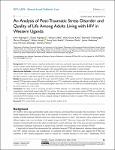| dc.description.abstract | Background: HIV/AIDS remains a significant global public health issue, profoundly impacting infected individuals. Living with HIV
involves complex mental health dynamics, with post-traumatic stress disorder (PTSD) being a prevalent challenge. This study aims to
examine the correlation between PTSD and quality of life among HIV-positive individuals in western Uganda.
Material and Methods: Conducted between May and July 2023, this facility-based cross-sectional study surveyed 439 participants
from four HIV clinics in southwestern Uganda. Data were collected through interviewer-administered questionnaires, analyzed using
descriptive statistics, simple linear regression, and multiple linear regression (p<0.05).
Results: Respondents had a mean age of 40.6 years, with 68.3% female, 54.9% married, and 55.1% lacking formal education. The
reported PTSD prevalence among HIV-positive individuals was 33.7%, significantly correlating with reduced overall quality of life (β
= −4.52; p<0.001). The social quality of life had the highest mean score of 14.24 (±3.45) while the environmental quality of life had
the lowest mean score 11.89 (±2.68).
Conclusion: Our study reveals a concerning prevalence of PTSD, affecting 1 in 3 individuals, emphasizing the pressing need for
comprehensive mental health support within HIV care settings. We observed a significant negative impact of PTSD on overall quality
of life, particularly in physical and social aspects. Integrating mental health screening into routine HIV care is crucial, using validated
tools like the PSTD Checklist Civilian Version, alongside training for healthcare providers to recognize PTSD symptoms in the context
of HIV diagnosis and treatment. | en_US |

